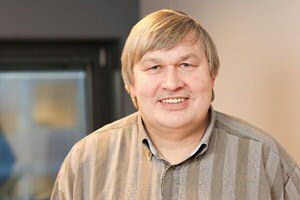Theoretisch bioloog Franjo Weissing krijgt Distinguished Lorentz Fellowship

RUG-hoogleraar theoretische biologie Franjo Weissing is verkozen tot Distinguished Lorentz Fellow voor het jaar 2017/18. Hij mag een half jaar lang verblijven aan het NIAS (Amsterdam) om te werken aan een project dat sociale wetenschappen en natuurwetenschap verbindt. Weissing zal zich richten op culturele evolutie.
De Distinguished Lorentz Fellowship (DLF) wordt jaarlijks toegekend aan een onderzoeker die werkt aan onderzoek dat de kloof tussen alfa-, gamma- en bètawetenschappen overbrugt. Het programma voorziet in een verblijf van vijf tot tien maanden in het Netherlands Institute for Advanced Study in the Humanities and Social Sciences (NIAS-KNAW). Daarnaast mag de ontvanger een workshop organiseren in het Lorentz Center (Leiden) en is er een persoonlijke prijs van €10.000.
Culturele evolutie
Weissing zegt zeer vereerd te zijn met de toekenning. In het plan dat hij met zijn voordracht indiende heeft hij aangegeven de mechanismen van culturele evolutie te willen bestuderen. ‘De Britse bioloog Richard Dawkins kwam enkele decennia geleden met het concept meme, een soort cultureel informatiepatroon dat zich kan vermeerderen en kan aanpassen.’ Een meme zou het culturele equivalent van een ‘gen’ uit de biologie zijn. Maar Weissing heeft grote bedenkingen bij dit concept. ‘Er zijn inmiddels veel modellen van culturele evolutie, maar die zijn heel erg door de biologie bepaald. De overdracht van memen gaat dan bijvoorbeeld van ouder op kind. Voor ideeën is dat een vreemde zaak, die kunnen net zo gemakkelijk van kind naar ouder gaan.’ Daarnaast ontstaat variatie in culturele informatie op een radicaal andere manier dan variatie in genen.
In zijn tijd als Lorentz Fellow wil Weissing op een rijtje zetten wat we nu eigenlijk weten over transmissie van culturele ideeën en over de theoretische grondslag van culturele evolutie. ‘Na dertig jaar onderzoek staat de theorie eigenlijk nog in de kinderschoenen.’ Naast een inventarisatie en de problemen die daar uit voortkomen wil hij ook proberen een aanzet te geven tot een nieuwe, beter onderbouwde theorie. ‘Daarvoor zijn dan ook bijdragen uit sociale wetenschappen nodig, denk aan de ontwikkelingspsychologie: hoe leren we eigenlijk?’
Workshop
Tijdens de workshop aan het eind van het programma zal hij critici en voorstanders van het idee van culturele evolutie bij elkaar brengen. De workshop moet leiden tot een wetenschappelijke bundel. Weissing ziet uit naar het half jaar bij het NIAS: ‘Ik geef veel onderwijs en doe dat met plezier. Maar ik ben blij om mij nu een tijd helemaal aan het onderzoek te kunnen wijden. En er zijn nog allerlei vragen op het terrein van evolutie die ik wil aanpakken.’
Het NIAS-Lorentz Programma is een samenwerking tussen het NIAS en hetLorentz Center en wordt ondersteund door de Koninklijke Nederlandse Akademie van Wetenschappen (KNAW) en de Nederlandse Organisatie voor Wetenschappelijk Onderzoek (NWO).
Meer informatie
-
Franjo Weissing
Meer nieuws
-
17 februari 2026
De lange zoektocht naar nieuwe fysica
-
10 februari 2026
Waarom slechts een klein aantal planeten geschikt is voor leven
